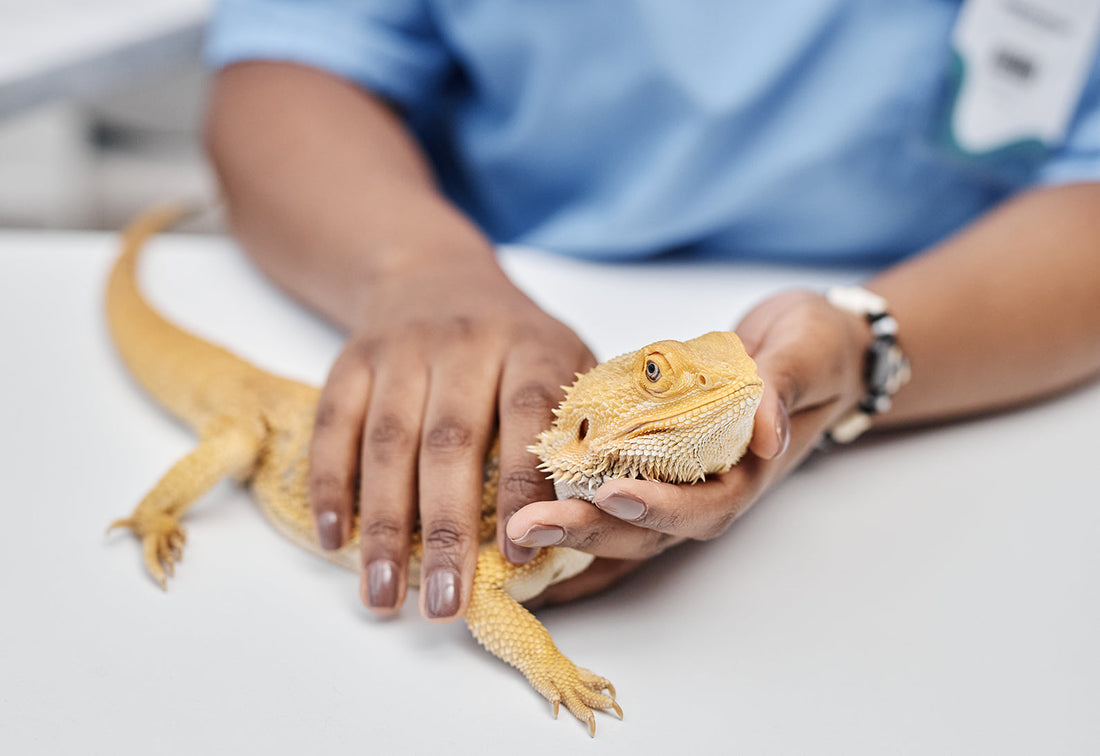How to tell when your beardie baby isn’t feeling their best.
Just like people, bearded dragons don’t always feel all sunshine and rainbows. But unlike humans, they can’t tell us when they have a tummy ache or frown when they’re unhappy. It’s up to us, their caretakers, to recognize signs of distress and take the appropriate action to ensure our scaly friends are safe, secure, healthy, and happy. Below are some telltale signs that something is not right with your lizard.
 Signs Your Dragon Feels Threatened
Signs Your Dragon Feels Threatened
Even the most badass beardie can feel scared or stressed out when a perceived threat or something unfamiliar enters their environment. There are many signs that indicate when your pet is feeling threatened:
Aggression - Even the most docile beardies can become aggressive and may bite when they feel they’re in danger.
Hissing - Hissing is a bearded dragon’s natural way to warn off potential threats.
Tail Whipping - Beardie’s can go full Indiana Jones when they’re stressed out.
Flattened body - A flattened posture, or “pancaking,” when not basking, can mean they feel threatened, especially when accompanied by other behaviors like head bobbing, hissing, or tail whipping.
Puffed-up, darkened beard - They’re not called bearded dragons for nothin’. When a beardie’s beard turns black and enlarged, it means they feel stressed or threatened.
Open mouth - Your dragon isn’t trying to sing. An open mouth, often accompanied by a puffed-up beard, is a sign of a stressed out dragon.

Head bobbing - Rapid head bobbing can mean they’re challenging or warning another bearded dragon.
Avoiding contact - If your pet consistently avoids human interaction, it could mean something is wrong.
Lethargy - An unusual lack of activity or engagement with you could mean your dragon is stressed or ill.
Not basking - Beardies love (and need) to bask. If yours isn’t soaking up their vitamin D when it should be, it could mean a problem.
Darkening- Bearded dragons may darken in color when stressed or feeling cold. Again, it’s usually most obvious in their beard.

Signs of Illness or Injury
Reptiles can get sick or hurt in a number of ways. It’s important to be vigilant by interacting with your beardie often to recognize when something is wrong or out of the ordinary, taking them to regular vet checkups, and knowing what to look out for.
 Lethargy - Lethargy is also a sign that something is physically wrong with your animal.
Lethargy - Lethargy is also a sign that something is physically wrong with your animal.
Not basking - Illness can also cause a dragon to refuse to bask.
Loose skin - If shedding is incomplete or there are signs of discoloration, irritation or skin infections, it could indicate a health problem.
Diarrhea - Eeeew. Most of the time, diarrhea is caused by stress, a change in diet, or bad food. But if it continues, it could indicate a more serious problem.
Constipation - While we’re on the subject of poo, if they’re struggling to go or not having regular BMs, it could be a sign of impaction. It causes discomfort and distress, and could lead to serious health issues or death if not treated. There are a number of remedies to help your pet pass yesterday’s salad, like a warm bath, tummy massage, or in extreme cases, being seen by a vet.
Weight loss - Unusual eating behaviors or sudden loss of appetite could mean stress, improper care, or a health issue.
Respiratory issues - Coughing, gasping, or wheezing is not normal, and should be taken seriously.Discharge - Goo coming from your dragon’s eyes, ears, nose, or mouth is a strong indication of sickness.
Eye issues - If your pet’s eyes are puffy, bulging or swollen, it means something is wrong.
 Spots - Unusual, sudden spots on their skin that are yellow, red, or black can mean your beardie is sick.
Spots - Unusual, sudden spots on their skin that are yellow, red, or black can mean your beardie is sick.
Body twitching or seizures - These could indicate a neurological disease like ADV (bearded dragon adenovirus), which is passed from dragon to dragon or through their poop.
What To Do if Your Dragon Is Showing Any of These Signs
First, don’t freak out. Your reptile can pick up on your stress, too, so it’s best to chill out. Most causes of distress are easily remedied.
First, try to determine what could be causing your pet to be stressed. Is it a change in their environment? The way you’re handling them? Did you change their diet recently? Make sure your beardie has a safe, secure, and comfortable enclosure that has the right temperature, lighting, and substrate. And always take care to handle your dragon gently, avoiding sudden movements or loud noises.
 If you suspect your reptile is ill, have them seen by a veterinarian as soon as possible. If you’re unsure, it’s better to be safe than sorry. Remember, a happy herp is a happy human. At least around here, it is. (:
If you suspect your reptile is ill, have them seen by a veterinarian as soon as possible. If you’re unsure, it’s better to be safe than sorry. Remember, a happy herp is a happy human. At least around here, it is. (:

